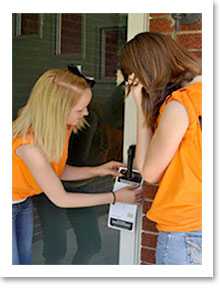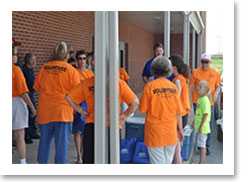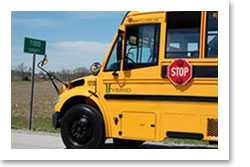A Creative Approach to a Common Preparedness Exercise Leads to Success
A public health emergency requiring large-scale antibiotic or vaccine dispensing to the public is a real threat.

CDC requires that states and localities have plans in place to ensure that communities can effectively deliver life-saving medications. A challenge that many communities face is getting medications to diverse populations who can’t come to a traditional health clinic or other “point-of-dispensing” locations. Robert McLellan, the health inspector and preparedness planner in a rural Kentucky county, formed a unique partnership to ensure that the people in his community could get these medications if needed.
Located in the southwestern section of Kentucky on the Tennessee border, Todd County covers almost 400 square miles. Similar to many local communities, there would be communication and transportation challenges to overcome to dispense medication during a public health emergency. Over 12,000 people live in Todd County, a significant segment of which includes an Amish population. The Amish do not rely on radio, television, or internet for information, nor do they use automotive transit options, typically traveling instead by horse and buggy or bicycle.
Coming up with a plan that would get medication to the people in the county took some creativity.

Robert regularly engages with the Community Health Alliance in Todd County, a group that has meetings where different partners (e.g., the mayor, schools, interfaith council, Red Cross, etc.) come together to solicit help and share information. At one of these meetings, he pitched his idea to have the Todd County Health Department partner with the Todd County School System Transportation Department to go door-to-door to test the county’s ability to dispense medication to the public. Robert also recognized that he could make this exercise meet multiple public health needs of his community. In addition to testing the ability to dispense medication, he saw it as a great opportunity to collect public health information from his county residents.
On two very hot summer days, his plan went into action. Ten school buses were enlisted to take 30 volunteers throughout the county. The volunteers’ goal was to distribute health department door hangers to as many homes as possible over the course of four hours. These door hangers not only stood in as proxies for medication in the exercise, but also were accompanied by a survey addressing smoking and health communication. Volunteers met at the Todd County High School for deployment. Mr. Carroll Moseley, Transportation Director of the Todd County School System, paired the volunteers with bus drivers and dispatched the buses. In addition to the bus routes, volunteers walked portions of the city of Elkton both days.
Due to this innovative partnership, the exercise was a roaring success.

A total of 1,294 door hangers/surveys were placed directly on household doors. During a public health emergency, an incident requiring mass dispensing to each of the 4,768 households in Todd County would take the 10 buses approximately 14 hours. However, there are 50 buses in Todd County available in a time of crisis. If all buses were used, Robert estimates that the entire county could be reached in three hours. In addition to demonstrating that medication could be delivered to residents quickly, the exercise also yielded great survey results. Of the cards distributed, 17% were returned (strong response for a volunteer survey), and the county gained valuable insight into smoking habits of its residents and details about how they get their public health information. Building on the lessons learned from this exercise, planning is underway for the next exercise.
- Page last reviewed: April 10, 2015
- Page last updated: April 10, 2015
- Content source:


 ShareCompartir
ShareCompartir